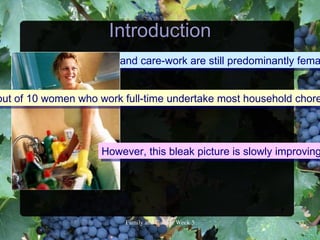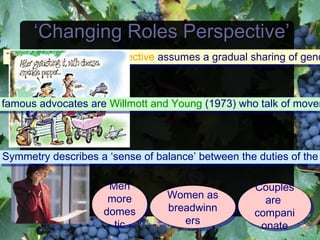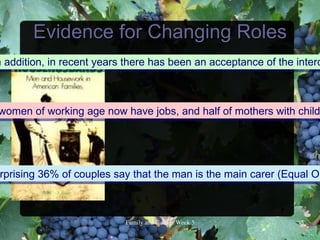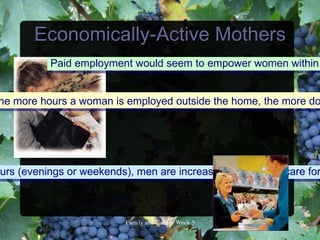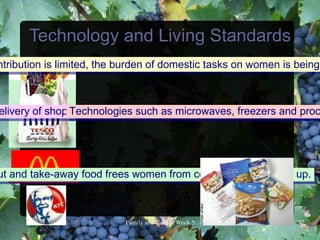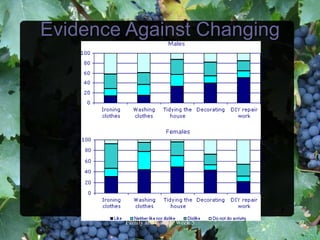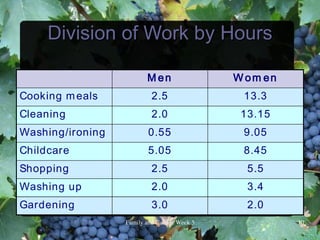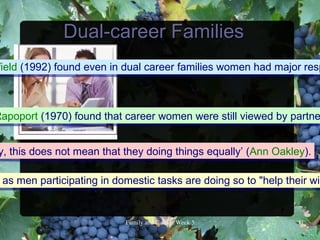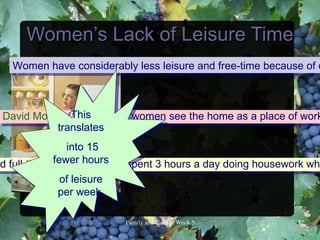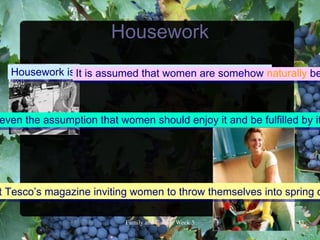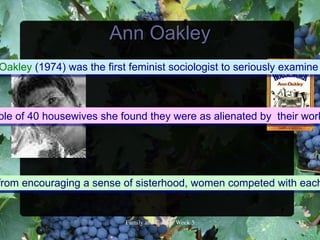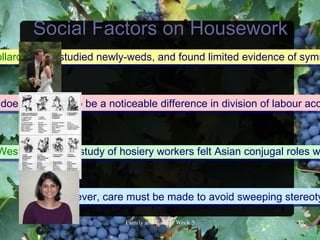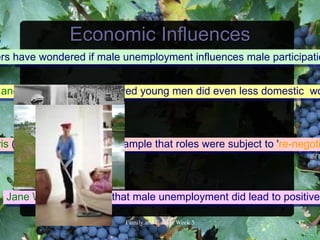Family week5(2)
- 1. AS Unit 1 Acquiring Culture; Family and Culture Week 5: Conjugal Roles
- 2. Objectives Have viewed this slide show you should be aware of: The changing roles perspective suggesting a growth of the companionate conjugal couple. The impact of employment and unemployment upon the division of labour. How women still undertake the bulk of domestic tasks. How technology and living standards are impacting upon roles. How power and authority relations still operate in ways that benefit men. Ideas of the 'triple shift' Family╠²and╠²Culture╠²Week╠²5 ╠² through recognition of emotion work. 2
- 3. Introduction Housework and care-work are still predominantly fema out of 10 women who work full-time undertake most household chore However, this bleak picture is slowly improving ╠² Family╠²and╠²Culture╠²Week╠²5 3
- 4. ŌĆśChanging Roles PerspectiveŌĆÖ The changing r├┤les perspective assumes a gradual sharing of gend famous advocates are Willmott and Young (1973) who talk of movem Symmetry describes a ŌĆśsense of balanceŌĆÖ between the duties of the Men Couples more Women as are domes breadwinn compani ╠² ers tic Family╠²and╠²Culture╠²Week╠²5 onate 4
- 5. Evidence for Changing Roles n addition, in recent years there has been an acceptance of the interc women of working age now have jobs, and half of mothers with child rprising 36% of couples say that the man is the main carer (Equal Op ╠² Family╠²and╠²Culture╠²Week╠²5 5
- 6. Economically-Active Mothers Paid employment would seem to empower women within he more hours a woman is employed outside the home, the more do ours (evenings or weekends), men are increasingly having to care for ╠² Family╠²and╠²Culture╠²Week╠²5 6
- 7. Technology and Living Standards ntribution is limited, the burden of domestic tasks on women is being elivery of shopping is time and labour microwaves, freezers and proc Technologies such as saving especially to women. ut and take-away food frees women from cooking and washing up. ╠² Family╠²and╠²Culture╠²Week╠²5 7
- 8. Other Factors That Promote Changing Roles ne and Ishii-Kuntz (1992) found delayed childbirth caused husbands This may be linked to the fact that women who have careers often es living standards meanmore equal than married couples. g suggest that they are families may employ cleaners, nannies, au p ╠² Family╠²and╠²Culture╠²Week╠²5 8
- 9. Evidence Against Changing Roles ╠² Family╠²and╠²Culture╠²Week╠²5 9
- 10. Division of Work by Hours Men W om en Cooking m eals 2.5 13.3 Cleaning 2.0 13.15 Washing/ironing 0.55 9.05 Childcare 5.05 8.45 Shopping 2.5 5.5 Washing up 2.0 3.4 Gardening 3.0 2.0 ╠² Family╠²and╠²Culture╠²Week╠²5 10
- 11. Dual-career Families field (1992) found even in dual career families women had major resp Rapoport (1970) found that career women were still viewed by partne y, this does not mean that they doing things equallyŌĆÖ (Ann Oakley). as men participating in domestic tasks are doing so to "help their wiv ╠² Family╠²and╠²Culture╠²Week╠²5 11
- 12. WomenŌĆÖs Lack of Leisure Time Women have considerably less leisure and free-time because of d This David Morley (1992) says: ŌĆśwomen see the home as a place of work translates into 15 fewer hours nd full-time working women spent 3 hours a day doing housework whi of leisure per week. ╠² Family╠²and╠²Culture╠²Week╠²5 12
- 13. Housework Housework is It is assumed that women are somehow naturally be viewed traditionally as : ŌĆ£womenŌĆÖs workŌĆØ. even the assumption that women should enjoy it and be fulfilled by it t TescoŌĆÖs magazine inviting women to throw themselves into spring c ╠² Family╠²and╠²Culture╠²Week╠²5 13
- 14. Ann Oakley Oakley (1974) was the first feminist sociologist to seriously examine ple of 40 housewives she found they were as alienated by their work from encouraging a sense factory workers. milar coping strategies as of sisterhood, women competed with each ╠² Family╠²and╠²Culture╠²Week╠²5 14
- 15. Social Factors on Housework ollard (1989) studied newly-weds, and found limited evidence of symm does not seem to be a noticeable difference in division of labour acc Westwood in her study of hosiery workers felt Asian conjugal roles w However, care must be made to avoid sweeping stereoty ╠² Family╠²and╠²Culture╠²Week╠²5 15
- 16. Emotion Work: ŌĆśTriple ShiftŌĆÖ women are increasingly seeking a ŌĆśhaven in a heartless worldŌĆÖ throug married wives were deeply disappointed with the lack of emotional rec 0 white couples who had been married 15 years and found women ty ╠² Family╠²and╠²Culture╠²Week╠²5 16
- 17. Economic Influences ers have wondered if male unemployment influences male participatio and Bell (1984), unemployed young men did even less domestic wo ris (1985) found from her sample that roles were subject to 're-negoti Jane Wheelock found that male unemployment did lead to positive ╠² Family╠²and╠²Culture╠²Week╠²5 17
- 18. Power and Authority sion-making as unequal, with men making important decisions. nd hersŌĆÖ marriage to reflect the power imbalance that exists. phrase ŌĆśdifferential consumptionŌĆÖ to reflect the power of men: women ╠² Family╠²and╠²Culture╠²Week╠²5 18
- 19. Conclusions There is evidence to support the 'changing roles' hypothesis. It would appear that womenŌĆÖs economic work is a key factor in promoting equality in the conjugal roles. ŌĆśNew manŌĆÖ is more caring and supportive, but there is limited evidence to support his existence. However, women still undertake an unfair bulk of domestic tasks. Oakley argues that many sociological studies of ŌĆśequalityŌĆÖ in marriage start from the assumption that cooking, cleaning and childcare are somehow ŌĆśwomenŌĆÖs work anywayŌĆÖ. ╠² Family╠²and╠²Culture╠²Week╠²5 19
- 20. Conclusions (continued) Feminists see this gender inequality of domestic work as stemming from a power imbalance. In addition, while couples may do things ŌĆśjointlyŌĆÖ, this does not necessarily mean that they do things ŌĆśequallyŌĆÖ. There is a clear imbalance in the quality and amount of leisure time female partners have. Male power and authority is reflected in patriarchal elements of the family. These include decision-making, differential consumption and financial management. ╠² Family╠²and╠²Culture╠²Week╠²5 20



